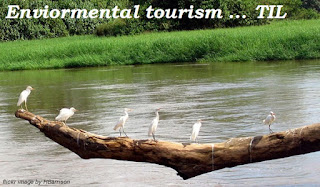The quality of the environment both all-natural and man-made, is
important to the tourism. Nevertheless, tourism's connection with the
environment is complicated. It includes many activities that can have negative
environmental effects.
Many of these effects are linked to the structure of
common infrastructures such as roadways and airports and of tourism facilities,
which includes resorts, hotels, restaurants, golf courses, shops, and marinas.
The negative impacts of tourism advancement can gradually destroy the
ecological resources on which it relies upon.
Alternatively, tourism has the potential to make beneficial
effects on the surroundings by contributing to environmental security and
preservation. It is a way to raise understanding of environmental values and it
can provide as a tool to finance security of natural areas and maximize their
economic significance.
 |
| Birds in Line |
Tourism and Environmental
Conservation
The tourism industry can contribute to environmental conservation
and protection through:
Contributions to
government revenues
Some government authorities collect money in much more far-reaching
and indirect ways that are not related to specific parks or preservation areas.
Taxes on sales, user fees, income taxes or rental of recreation equipment and
license fees for actions such as hunting and fishing can offer governments with
the funds required to manage natural resources.
Such resources can be used for
general conservation programs and actions, such as park ranger salaries and
park routine maintenance.
Direct financial
contributions
Tourism can lead directly to the preservation of sensitive areas
and the environment. Sales revenue from park entrance fees and related sources
can be allocated particularly to pay for the security and management of
environmentally delicate areas. Special fees for park functions or conservation
actions can be collected from tourists or tour providers.
Improved environmental
management and planning
Good environmental control of tourism facilities and particularly
hotels can increase the advantages to natural areas. But this needs careful
planning for controlled improvement, based on analysis of the ecological
resources of the area. By organizing early for tourism improvement, damaging
and expensive problems can be avoided, avoiding the gradual destruction of
environmental assets important to tourism.
Clean production techniques can be essential tools for planning
and manage tourism facilities in a way that reduces their environmental
impacts. Waste treatment and convenience are often major, long-term
environmental problems in the tourism business, pollution protection, and waste
minimization techniques are particularly essential for the tourism industry.
Environmental awareness rising
Tourism has the prospective to increase public admiration of the
environment and to spread understanding of environmental problems when it
brings people into deeper contact with Mother Nature and the environment. This
potential fight may heighten awareness of the worth of nature and lead to
ecologically conscious behavior and actions to preserve the environment.
If it is to be maintainable in the long run, tourism must
integrate the principles and practices of sustainable consumption. Sustainable
intake includes building consumer requirement for products that have been made
using cleaner development techniques and for services which includes tourism
services that are provided in a way that minimizes environmental effects.
Tourists and tourism-related businesses consume a tremendous
quantity of goods and services; shifting them toward using those that are
developed and provided in an ecologically sustainable way, from cradle to
grave, could have a tremendous positive impact on the planet's environment.
EmoticonEmoticon